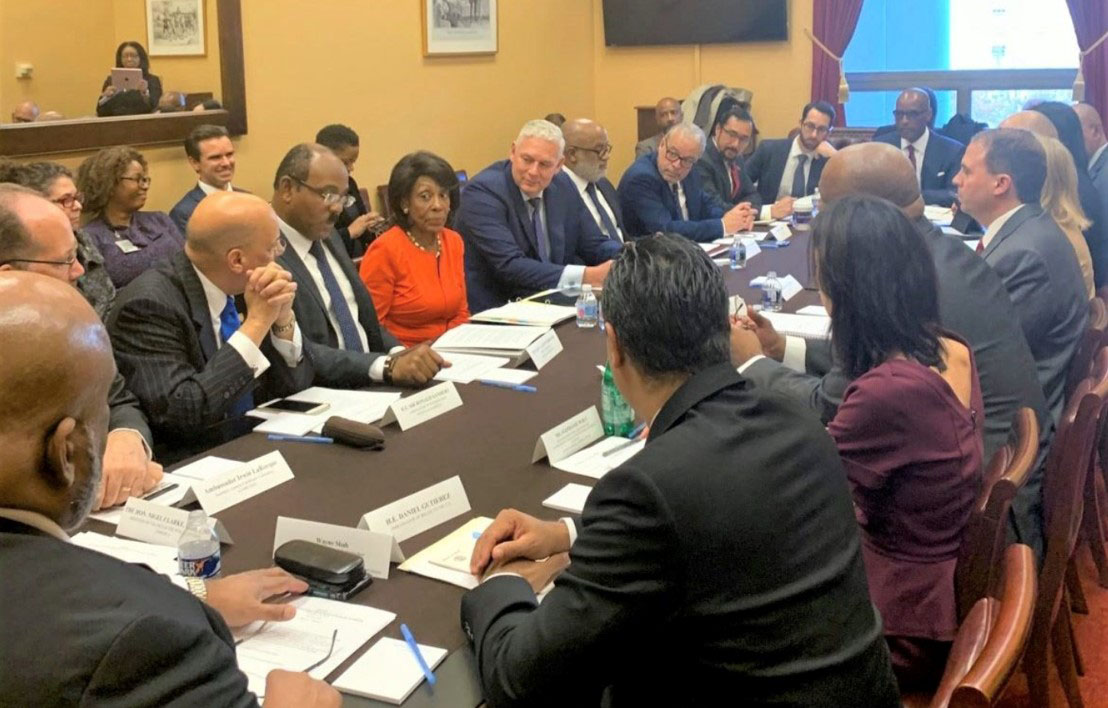Representatives of CARICOM had a fully attended Roundtable meeting on Tuesday with members of the U.S. Congress and senior representatives of major U.S. banks, concerning the effects of de-risking and the withdrawal of correspondent banking relations (CBRs).
According to a release yesterday from the Organisation of Eastern Caribbean States, the Round-table was first proposed by Antigua and Barbuda’s Prime Minister, Gaston Browne, at last July’s meeting of CARICOM Heads of Government. Since then, Antigua and Barbuda’s Ambassador to the U.S., Sir Ronald Sanders, worked with Congresswoman, Maxine Waters, as Chair of the Committee on Financial Services of the U.S. House of Representatives to make it happen.
Guyana is one of the CARICOM countries that has been hard-hit by the withdrawal of correspondent banking relations by US financial institutions.
Senior Bankers from six major U.S. Banks and U.S. Congress persons gathered with a delegation representing CARICOM at Capitol Hill in Washington, under the Chairmanship of Waters.
The CARICOM team was led by Antigua and Barbuda’s Prime Minister who is the lead Head of Government on financial matters.
Browne, the release said, told the meeting that the Caribbean and the U.S. have “a mutuality of interests” which necessitated each side showing active concern about the well-being of the other, including security.
In this regard, Browne argued that the process of de-risking, which has led to a withdrawal of relations by some U.S. banks from Caribbean banks, poses a serious threat to the region’s welfare, including its ability to import goods from the U.S., which totalled over US$13 billion last year, and is set to exceed this figure this year.
The release said that representatives of the U.S. banks said that they recognise the value of CBRs, not only in financial terms but in the vital role it plays in global trade, investment, and other financial services. They voiced a keen interest in overcoming the challenges posed by a regulatory environment in which banks are conscious, in their decision-making, of the severe penalties for acts of money laundering and terrorism financing. The banks made a number of helpful proposals for how this issue could be tackled, the release said.
In response, Browne pointed out that over the last 10 years, US$26 billion has been applied worldwide as fines for non-compliance with money laundering, but not one bank was sited in the Caribbean.
U.S. legislators voiced alarm at the effect on the Caribbean of de-risking and the loss of CBRs from U.S. banks as well as the effect on U.S. national security if the situation worsens, the release added. The Roundtable concluded that the problem has to be tackled urgently and at several levels. All participating groups at the meeting resolved to work on solutions that arose from the discussion.
The release said that Browne expressed “great satisfaction” with the outcome of the meeting and the obvious commitment of U.S. legislators and the U.S. banks to work with the Caribbean on solutions. He told the meeting that what is required is “to build trust and confidence between correspondent banks in the U.S. and respondent banks in the Caribbean in a transparent relationship”.
Congresswoman Waters declared that she and the U.S. House Committee on Financial Affairs will remain engaged on the issue and are willing to take actions that may be necessary to preserve the mutual interests of the U.S. and the Caribbean.
Caribbean governments were represented by the Prime Minister of Saint Lucia, Allen Chastanet; the Finance Minister of Jamaica, Nigel Clarke; the Attorney-General and Minister of Legal Affairs of Barbados, Dale Marshall; the National Security Minister of Trinidad and Tobago, Stuart Young; and the CARICOM Secretary-General Irwin LaRocque.






